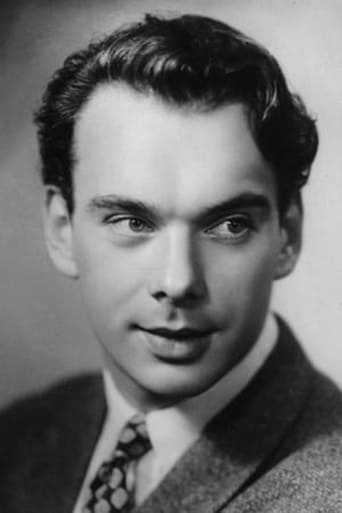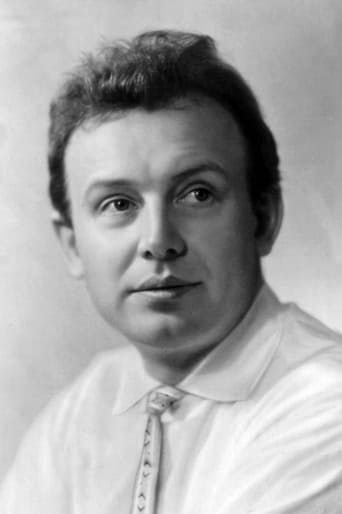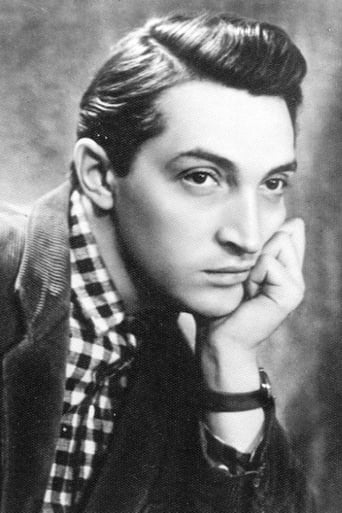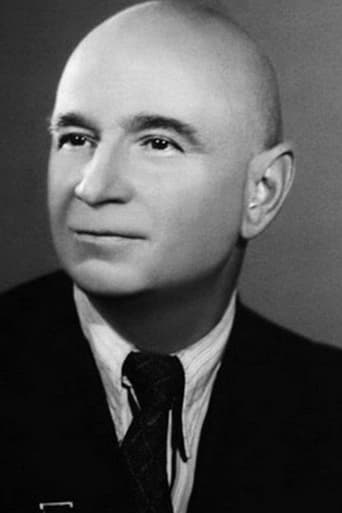Beanbioca
As Good As It Gets
Voxitype
Good films always raise compelling questions, whether the format is fiction or documentary fact.
Neive Bellamy
Excellent and certainly provocative... If nothing else, the film is a real conversation starter.
Kien Navarro
Exactly the movie you think it is, but not the movie you want it to be.
SocalSam
This is a movie that you must see if you want to see science and the process of fail-success. The tension is built up with the exposure of two scientists, one of whom marries another scientist.
The set varies between the nuclear test lab, which is likely a real life decommissioned ammunition bunker and production factory. External scenes are the usual woodsy and natural tableau seen in these Soviet propaganda films. Food is abundant, as is booze. Each night seems to be a party. People are a little more cheerful than I think the population was. The apartments that the scientists live in seems larger than what one thinks of in the Soviet Union.
Camera work is sharp, with each image having a depth of field that you don't see in US films. Acting is focused, the actor eyes all seem to be lasers looking into the depth of quantum mechanics.
During a visit to relatives, the scientist hitch a ride on a steam train with only flatcars, their feet hanging over the sides of the cars. There was no attempt to hide the primitive technology that resided in parallel with this insanely advanced technology drive.
If you are science nerd see this movie.
dkwootton
Nine Days of One Year (1962) was directed by Mikhail Romm and is part of the Khrushchev Thaw in Soviet filmmaking. The premise of the Cold War-era film is ballsy as it concerns the development of weapons of mass destruction. Mitya Gusev, a talented physicist, desires to harness his scientific discovery for the benefit of communism (by providing the energy for his brethren), but others along his path prompt Gusev to use his breakthrough for war. The unique narrative that highlights only nine days over the course of a year is particularly striking. By privileging only a few moments, the film creates an underlying importance in every waking moment. Gusev possesses the innocence and "childishness" (the "adults" being apathetic) that categorized the heroes of the Khrushchev Thaw; Gusev describes himself as having "more enthusiasm than brains." Although Aleksey Batalov maintains many of the same attributes in Gusev that he carried as Boris in The Cranes are Flying (1957) (including his ultimate sacrifice for the greater good), in Nine Days of One Year he is cold, distant and unaffectionate towards Lyolya failing to even notice the robe that she's worn for the entirety of the month. Instead of simply filming men debating the fate of the world, Nine Days also simultaneously portrays the budding and eventual disintegration of a marriage as we dive into the depths of Lyolya's psyche as she tells her husband, "(she) is a woman, not a domestic pet." Her viewpoint is equally privileged to that of Gusev adding a greater dimension to the film as well as adding to its overall success. The opening of the film spares no time for exposition. It grabs you by the collar from the opening shot as we fly over a miniature towards the Institute. The form in the film is remarkable. In one instance, the camera drops down to the dinner table as if a bomb is being dropped on the discussion. The scene is concluded pulling back into the sky as if detracting from the crucial moment in order to recognize the smallness of the conversation in the grand scheme of humanity. While there are shots of pure dynamism (rapid whip pans, Dutch angles and quick cutting), Romm often favors a wide lens, low angles and elaborate in depth staging in long takes to carry forth the narrative. Romm gives us an incredible extreme long shot of Gusev walking to the lab on the eighth day across a blank brick wall. The stark emptiness within the frame creates a canvas for the audience to project Gusev's feelings – how does the failure to discover thermonuclear energy weigh on Gusev, and most of all, is the ultimate sacrifice worth it? The film also poses an interesting question earlier on – is the basis of humanity's perfection measured in its ability to exterminate itself?
Emil Bakkum
Once more my experience with Soviet films is confirmed: they are slow and too long and lack any suspense - like a bad love affair. In addition "Nine hours of a year" concerns the daily life in a laboratory of nuclear physics, which is itself a bore (= a man who, when asked how he is, tells you). There are a pile of nuclear physicists (inside joke), a number of mathematicians, an amalgamation of metallurgists and a line of spectroscopists. The main characters are a married couple of physicists, who drag out a stalemate position. Of course it is a drama to observe two (or more) immature adults, who just seem to vegetate. But not every drama qualifies as an interesting theme, and this film proves it. Still he has some value, provided that you place him in his proper context. So, are you ready? The real story is about ethics and morals! The Soviet Union justified its existence on the ground, that she eliminates the alienation of the working class. In the Leninist state the personal interest is supposed to coincide with the general interest (read: the interests of the state). In the first years there were the Subbotniks, collectives who continued working in their leisure time. Solshenytsin describes in his books a true case of a simple laborer, who is so naive that he physically works himself to death. It is morbid (= higher offer). To be fair, there is the capitalist analogy of the imperious business man, with his fits and cardiac affections - although the capitalist is still inclined to self preservation and selfish (= what the owner of a sea food store does). After Stalin the Soviet ideology began to enrich the collective moral with the formation of the unique personality. This paradox (= two physicists) even led to the ideological conflict and rupture with China, where Mao continued to fight individualism. Although the film is no propaganda (= a gentlemanly goose), his production may well be a reaction to this alienation between comrade states. However, the enlightenment remained poor. The democratic centralism (= the expression of deviating morals is forbidden - seriously!) continued to be the state policy during the whole existence of the Soviet Union. This spiritual climate, in combination with a strong work ethics, may indeed foster the self-destruction of people in the would-be interest of the common good. Unfortunately I doubt that the uninformed watcher, who by nature adheres to individualism, will pick up this message from the film. I hope that you enjoyed my comments (if so, don't forget to check off "useful: yes"). By the way, IMDb actually pays you. While browsing through reviews I noticed one by a Rumanian, who shares my interests. And following his strand of reviews I stumbled over Nine hours of a year. What an amazing way to save time.
dminkin
Nine Days of One Year refers not to nine consecutive days but rather to the Narrator of the film cherry-picking nine important days in the lives of two nuclear scientists and the woman they both love. The movie is set during the recent thaw in the time of the Cold War and uses the same lead actor we saw in The Cranes are Flying, the great Alexey Batalov. The director, Mikhail Romm, strives to reveal a community that had been veiled during Stalin's years. Ilya, Gusev, Lyolya; three physicists connected by bonds stronger than friendship, are tasked with illuminating the mysterious world of science and technology that had (and is) often closed to the public. An amazing achievement for its subject matter, the film was both produced and set in the time of the thaw; it is a film that claims in the very beginning through its Narrator that besides scientific inaccuracies committed here and there, all other facets of this movie are as close to representing the truth as possible. One can sense immediately that the film does not merely seek satisfaction in developing and propagating a story, whatever merits contained within notwithstanding (be it setting, theme, special mechanics, character development, dialogue, screenplay); it has incorporated a narrator to expedite the process while maintaining a basic necessary structure. The film instead yields many questions about the nature of scientific discovery and the potentially deadly consequences contained within those discoveries that affect both the scientific community and mankind at large. In fact, so great is the feeling of impartiality in the presentation of these questions, an agenda so strong that the characters cease to be themselves and turn into the mouthpiece of a tangible abstraction, an unnamed character both invisible yet omnipresent. We first become aware of it when Sintsev's manic obsession with his work in the nurse's room gives way, suddenly, to a moment of complete clarity and sensitivity to Gusev, the man who had been exposed to 200 roentgens of nuclear radiation; Sintsev suggests that Gusev find a girl before it is too late. How very uncharacteristic of a man who was just earlier celebrating his scientific breakthrough and ready to keep working even though in Gusev's words "he had killed himself" due to the exposure. Other times amid the scientific banter, theories, thought experiments and the like littering the movie, comes more transcendent ideas, detailing the correlation of scientific progress with the advent of war, a conversation played out by two scientists, whose conclusion is that the interests of science are aligned with those of war. Ilya and Gusev may be two more vessels for this omnipresent guiding voice while Lyolya seems to be purposefully granted immunity; for she is granted her own private thoughts, and is the one character who doubts herself as a scientist and instead thinks first of herself as a wife. Ilya questions the ultimate implications of scientific discovery and asks, "What good does it do?" Gusev, however, the character most immersed in the scientific realm and obsessed by his work, perhaps offers the greatest and strangest consolidation of the essence of the film. In a letter closing out the film, written to Ilya and Lyolya, he draws a picture of the three holding hands and asks to grab a bite to eat at a local café. The scene is a breathtaking exposition that humanity is more important than progress, which of course can be read as a refutation of the communist ideal.



